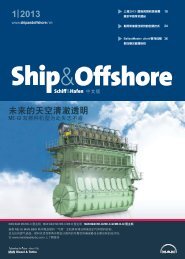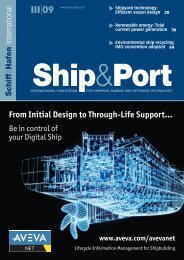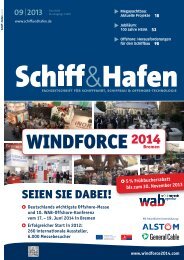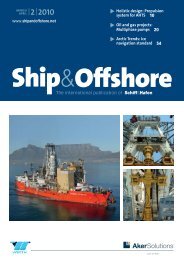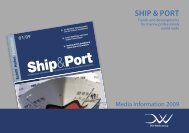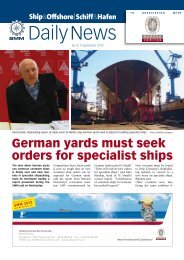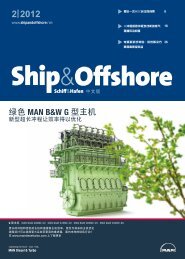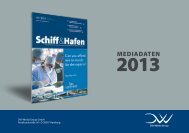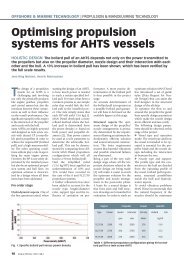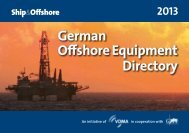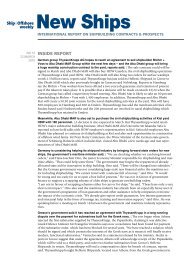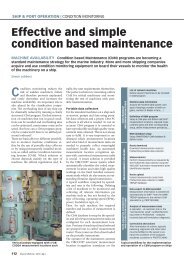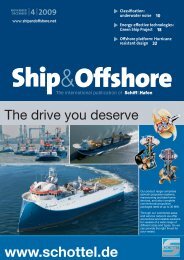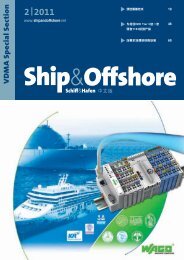Download - Shipandoffshore.net
Download - Shipandoffshore.net
Download - Shipandoffshore.net
You also want an ePaper? Increase the reach of your titles
YUMPU automatically turns print PDFs into web optimized ePapers that Google loves.
Monday, May 13th<br />
Tuesday, May 14th<br />
Wednesday, May 15th<br />
Thursday, May 16th<br />
Cylinder lubrication – utilising the latest findings on<br />
low-speed two-stroke diesel engine oil stress from<br />
field and laboratory engine testing in the<br />
development of a wide range cylinder lubricant –<br />
Shell Alexia S4<br />
Jose Luis Garcia Ojeda, Shell Global Solutions (Deutschland) GmbH, Germany<br />
Jerry Hammett, Shell Global Solutions (Deutschland) GmbH, Germany<br />
John Schakel, Shell Global Solutions (Deutschland) GmbH, Germany<br />
Jens Moeller, Shell Global Solutions (Deutschland) GmbH, Germany<br />
In recent years, legislative changes and financial pressures have<br />
driven shipowners and operators to adopt new operational strategies.<br />
As a consequence, operational flexibility in terms of main<br />
engine loading and fuel choice has become not only a need, but<br />
a proven solution used to address environmental and economic<br />
performance needs of the marine transportation sector (particularly<br />
in the container vessel segment). In this context, a broader<br />
operational window for modern low speed two-stroke marine<br />
diesel engines has introduced new challenges that need to be considered<br />
in cylinder lubrication and have highlighted new performance<br />
required of the cylinder lubricant in order for it to deal more<br />
effectively with these changes. The influence of a highly variable<br />
operational profile results in a cylinder lubricant being exposed<br />
to stress levels that until now it has not been optimally designed<br />
for. This paper provides a summary of new investigations into<br />
low speed two-stroke cylinder oil stress under a broad range of<br />
operational conditions and presents these findings as the basis<br />
for the design of a wide range cylinder lubricant that is able to<br />
outperform traditional 70 BN cylinder lubricants across a highly<br />
flexible operational profile in terms of fuel choice, ambient conditions<br />
and engine loading. As part of the development process of<br />
a wide - range cylinder lubricant, the paper will discuss some aspects<br />
of how a fundamental understanding of oil stress in the low<br />
speed two-stroke diesel engine has significantly increased the importance<br />
and relevance of using a laboratory engine. Recent developments<br />
of new test protocols and engine control systems of the<br />
Bolnes 3(1) DNL 170/600 laboratory engine will be discussed and<br />
highlighted, to show how it can be used to generate reliable and<br />
repeatable test data for the process of discovering and benchmarking<br />
candidate formulations, thus proving their robustness and<br />
readiness for testing in the field in a full size engine that is capable<br />
of discriminating the performance of a lubricant. In particular this<br />
paper will discuss the increasing relevance of using such testing<br />
as a means of challenging traditional approaches to base number<br />
and performance relationships. Finally, the paper will show summarised<br />
results of more than 30,000 accumulated running hours<br />
with Alexia S4 on a number of engine types, sizes, ages and operational<br />
profiles, referenced against previous conventional 70 TBN<br />
cylinder lubricants.<br />
For the past several decades, the marine industry has been a conservative<br />
environment with very little changes in legislations and<br />
engine design. By the end of the previous century, however, the<br />
demands for more engine power, coupled with increased environmental<br />
awareness, have triggered tremendous changes in this<br />
industry segment. Recent and upcoming emission legislations require<br />
the use of low-sulphur fuel oil in environmentally sensitive<br />
areas. This triggers the need to have multiple high-quality cylinder<br />
oil grades available to tackle the changing fuel market. Thus, the<br />
selection of the correct cylinder oil to optimise engine lubrication<br />
is more important than ever. By extensive research on the operation<br />
of marine engines, Chevron has developed tools to operate marine<br />
diesel engines reliably, even when dealing with high variations in<br />
fuel quality. Traditionally, drip oil analysis (also called piston underside<br />
analysis) has been used to determine the optimum lubrication<br />
parameters to operate a low-speed marine engine. These optimum<br />
parameters are achieved by varying the base number (BN)<br />
or alkalinity level of the lubricant, or by adjusting the amount of<br />
oil injected to match the sulphuric acid present in the combustion<br />
chamber. The appetite for alkalinity is an indication of the corrosion<br />
sensitivity of the engine, and can vary substantially between<br />
different engine types. Every engine has a point at which oil feed<br />
rate becomes insufficient, and where iron, an indication of ongoing<br />
corrosion and wear, starts to increase. Traditionally, a measured<br />
drop in BN was used to determine this point; however, with marine<br />
fuels not containing any sulphur becoming more common,<br />
BN is no longer a suitable tool to determine optimum lubrication.<br />
Chevron has accumulated a vast database, which contains more<br />
than 15,000 samples, taken under a wide variety of engines, fuels<br />
and operating conditions. This paper will report the findings on research<br />
performed on marine engine oil performance under a wide<br />
range of residual and distillate fuels.<br />
Multifunctional marine cylinder lubricants<br />
naozumi Arimoto, JX nippon Oil and Energy Corporation, Japan<br />
Shigeki Takeshima, JX nippon Oil and Energy Corporation, Japan<br />
Reliable lubrication of low-speed engines operated<br />
with varying fuel sulphur levels<br />
Luc Verbeeke, Chevron, Belgium<br />
Marc De Weerdt, Chevron, Belgium<br />
Rudy Sanders, Chevron, Belgium<br />
Rik Truijens, Chevron, Belgium<br />
May 2013 | Schiff&Hafen | Ship&Offshore sPeCiaL 23



